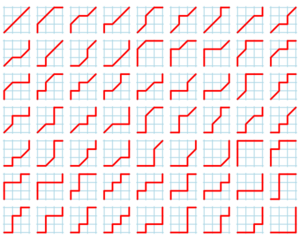63 (number) facts for kids
Quick facts for kids
|
||||
|---|---|---|---|---|
| Cardinal | sixty-three | |||
| Ordinal | 63rd (sixty-third) |
|||
| Factorization | 32× 7 | |||
| Divisors | 1, 3, 7, 9, 21, 63 | |||
| Greek numeral | ΞΓ´ | |||
| Roman numeral | LXIII | |||
| Binary | 1111112 | |||
| Ternary | 21003 | |||
| Senary | 1436 | |||
| Octal | 778 | |||
| Duodecimal | 5312 | |||
| Hexadecimal | 3F16 | |||
63 is a fascinating natural number that comes right after 62 and just before 64. It's known as a composite number, which means it can be divided evenly by more numbers than just 1 and itself.
Contents
Exploring the Number 63
What Makes 63 Special?
The number 63 has some cool properties. For example, if you add up the first six powers of 2, you get 63! This means 20 (which is 1) + 21 (which is 2) + 22 (which is 4) + 23 (which is 8) + 24 (which is 16) + 25 (which is 32) all add up to 63.
63 is also a type of number called a square-prime. This means it's made by multiplying a prime number squared by another prime number. For 63, it's 32 (which is 9) multiplied by 7 (which is a prime number). So, 9 × 7 = 63. It's the second number like this that uses 3 squared.
63 in Patterns and Shapes
Imagine building shapes with dots. 63 is a "centered octahedral number." This means you can arrange 63 dots to form an octahedron (a shape with eight faces) with a dot exactly in the middle. It's the fourth number in this special sequence, following 7 and 25.
63 is also known as the third Delannoy number. These numbers help us count how many different paths you can take on a grid. Imagine a 3x3 grid, like a tic-tac-toe board. If you start at the bottom-left corner and want to reach the top-right corner, moving only right, up, or diagonally up-right, there are exactly 63 different ways to do it!
Mersenne Numbers and 63
You might have heard of Mersenne primes. These are prime numbers that can be written as 2n - 1. Numbers in this form are called Mersenne numbers. 63 is a Mersenne number because it can be written as 26 - 1 (which is 64 - 1 = 63).
However, 63 is not a Mersenne prime because it's a composite number (it can be divided by 3, 7, 9, 21, and 63). It is the forty-fourth composite number.
Interestingly, 63 is the only Mersenne number whose prime factors (3 and 7) are themselves factors of earlier Mersenne numbers. For example, 3 is the first Mersenne prime (22 - 1), and 7 is the second (23 - 1).
63 sits between two important Mersenne primes: 31 and 127. Did you know that 127 is the thirty-first prime number? Also, 63 is the thirty-first odd number if you count them as 2n+1.
Other Cool Facts About 63
63 has 36 numbers that are coprime to it (meaning they share no common factors other than 1) and are smaller than 63. This is called its Euler totient.
See also
 In Spanish: Sesenta y tres para niños
In Spanish: Sesenta y tres para niños
 | Misty Copeland |
 | Raven Wilkinson |
 | Debra Austin |
 | Aesha Ash |


